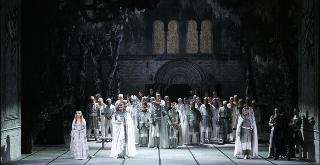|
Back
Orientalism Revisited Milano
Teatro alla Scala
06/05/2018 - & June 9, 12, 15, 19, 27*, 30, 2018
Franz Schubert: Fierrabras, D. 796
Tomasz Konieczny/Sebastian Pilgrim* (König Karl), Anett Fritsch (Emma), Markus Werba (Roland), Peter Sonn (Eginhard), Lauri Vasar (Boland), Bernard Richter (Fierrabras), Dorothea Röschmann (Florinda), Marie-Claude Chappuis (Maragond), Gustavo Castillo (Brutamonte), Martin Piskorski (Ogier), Alla Samokhotova (A maiden)
Coro del Teatro alla Scala, Bruno Casoni (chorus master), Orchestra del Teatro alla Scala, Daniel Harding (conductor)
Peter Stein (stage director), Ferdinand Wögerbauer (sets), Anna Maria Heinreich (costumes), Joachim Barth (lights)

(© Brescia-Amisano/Teatro alla Scala)
Orientalism was given a fatal blow in 1978 when Columbia University academic Edward Said, known among music lovers as co-founder, with Daniel Barenboim, of the West-Eastern Divan Orchestra, published his seminal book of the same name (Orientalism, Pantheon, 1978). Orientalism, the field of studying the East, has long portrayed the East as “The Other” and has been used to justify colonialism and the West’s exploitation of the non-Western world. Forty years after its publication, the world has changed drastically, at least in its discourse. It would seem that stage director Peter Stein has probably never heard of the late Edward Said or of Orientalism. His simplistic staging of Schubert’s Fierrabras – from another era – emphasizes the weakness of the libretto. Opera, as a mirror of Western civilization, offers a faithful representation of European thought, including its view of the East throughout the ages. A gradual but marked transformation appears in the early days of opera to the eighteenth century, the Enlightenment having much contributed to a more tolerant view of “The Other.” Think of the progression from Handel’s Armida to Mozart’s Die Entführung aus dem Serail and Rossini’s L’Italiana in Algeri. Four decades after the French Revolution, the libretto of Fierrabras was indeed anachronistic in its approach to the East.
The music of Fierrabras, as with almost all of Schubert’s works, is beautiful. However, the libretto is a disaster, not much helped by Peter Stein’s unimaginative staging. Ferdinand Wögerbauer’s sets consisted of black and white moving panels in the style of Piranesi. They were visually pleasant and gave the production a fairy tale atmosphere. Anna Maria Heinreich’s black and white costumes were bland: the Christians are dressed in white and the Muslim, in black. The Muslim fighters’ costumes were more like those of ISIS/Daesh than those of Moorish Spain. The Moorish prince, Fierrabras, resembled a bloodthirsty fanatic, not the enamored young romantic, as his role was originally conceived. Such political incorrectness is inadmissible, especially in our time. Music is meant to bridge differences, not to inflame intolerance. In outdated “orientalist” fashion, the sets for Moorish Spain were a of belabored “Eastern styles” seemingly inspired by Indian Mughul architecture.
This was the first performance of a Schubert opera at La Scala’s main Piermarini hall. More noted for his lieder, piano and orchestral works, Schubert was perhaps too much of an minimalist for grand stage works. Despite beautiful melodies and agreeable vocal writing, none of his operas were successful. This was, in part, due to their poor libretti. Composed in 1823, Fierrabras was stillborn; it was never produced during the composer’s short life. Its premiere was in Karlsruhe in 1897, and it has since failed to gain a place in opera’s repertoire. In 1988, Claudio Abbado chose to have it produced in Vienna. This started a mini-renaissance of the work. La Scala’s production was imported from Salzburg as a homage to Abbado, who led the venerable Milanese opera house for two decades. The La Scala premiere coincided with what would have been the late maestro’s 85th birthday.
The cast was dominated by Dorothea Röschmann and Bernard Richter as Florinda and Fierrabras, daughter and son of the Moorish Prince Boland. Röschmann’s third act aria “Des Jammers herbe Qualen” was especially moving. Anett Fritsch, as Emma, the daughter of Charlemagne, had a brilliant light soprano but experienced difficulty in the upper register. Baritone Markus Werba as Roland impressed with his poised style and clear diction. Tenor Peter Sonn sang with the elegance and style. His second act aria “Im jungen Morgenstrahle” was an unexpected high point. The music was sweet, often sounding more appropriate for comedy than epic drama. Most charming were the choral parts and the ensembles, such as the finale of the first act “Fort zum Siegesreigen.” Some of the best arias and duets are reminiscent of lieder, such as act one’s Eginhard/Emma duet “Der Abend sinkt auf stiller Flur,” and the Florinda/Maragond duet in the second act, “Weit über Glanz und Erdenschimmer.”
The chorus was well-rehearsed, and their German diction excellent, no mean feat for Italians. Daniel Harding ably led La Scala’s fine orchestra with aplomb. Despite his elegant style and brisk tempi, one occasionally felt the work’s occasional tedium, but for this, he is not to be blamed.
Ossama el Naggar
|